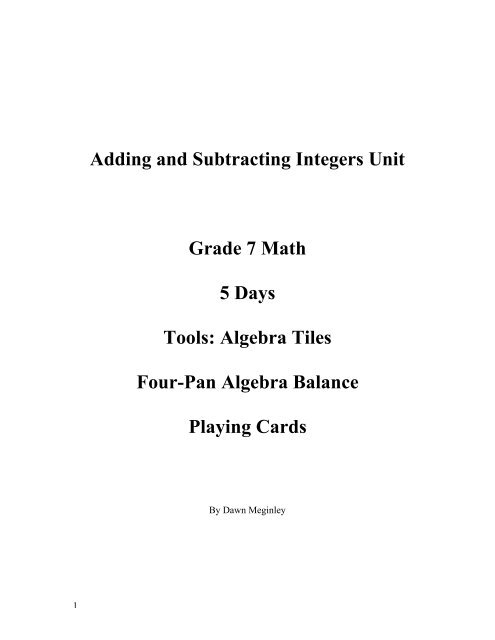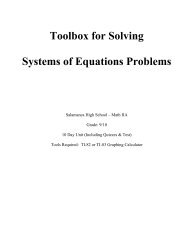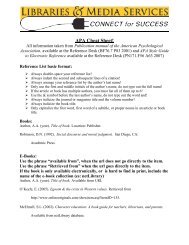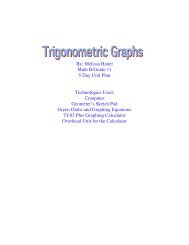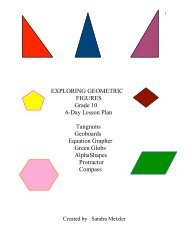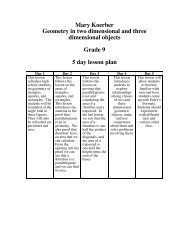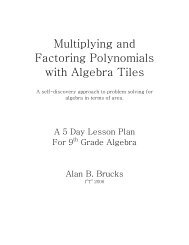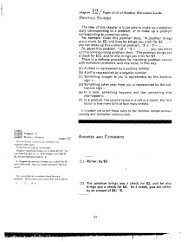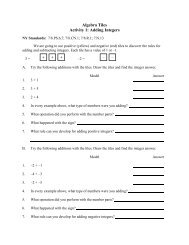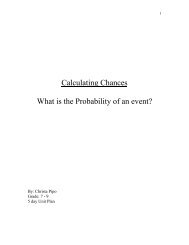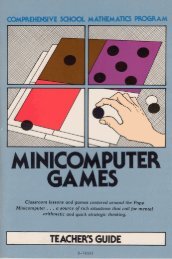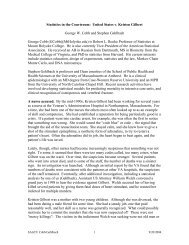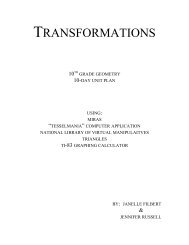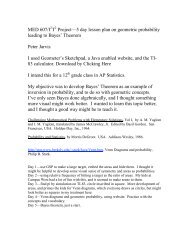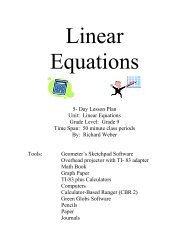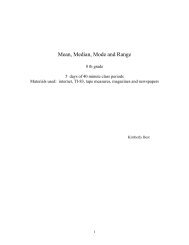Adding and Subtracting Integers Unit Grade 7 Math 5 Days Tools ...
Adding and Subtracting Integers Unit Grade 7 Math 5 Days Tools ...
Adding and Subtracting Integers Unit Grade 7 Math 5 Days Tools ...
Create successful ePaper yourself
Turn your PDF publications into a flip-book with our unique Google optimized e-Paper software.
<strong>Adding</strong> <strong>and</strong> <strong>Subtracting</strong> <strong>Integers</strong> <strong>Unit</strong><strong>Grade</strong> 7 <strong>Math</strong>5 <strong>Days</strong><strong>Tools</strong>: Algebra TilesFour-Pan Algebra BalancePlaying CardsBy Dawn Meginley1
Objectives <strong>and</strong> St<strong>and</strong>ardsObjectives:• Students will be able to add positive integers together.• Students will be able to add negative integers together.• Students will be able to define the additive inverse <strong>and</strong> apply it in adding integerstogether <strong>and</strong> finding zero pairs.• Students will be able to define zero principle <strong>and</strong> apply it to solve integer additionproblems.• Students will be able to define the commutative property of addition <strong>and</strong> use it tosolve problems.• Students will be able to add positive integers to negative integers• Students will be able to subtract positive integers from positive integers.• Students will be able to subtract negative integers from negative integers.• Students will be able to subtract positive integers from negative integers.• Students will be able to subtract negative integers from positive integers.• Students will be able to compare integers.• Students will be able to discover the rules for adding <strong>and</strong> subtracting integers.NCTM St<strong>and</strong>ardsNumber <strong>and</strong> OperationsProblem SolvingCommunicationConnectionsRepresentationsNew York State St<strong>and</strong>ards, KIs, <strong>and</strong> PIsSt<strong>and</strong>ard 3 <strong>Math</strong>ematics--Students will be able to underst<strong>and</strong> mathematics <strong>and</strong> becomemathematically confident by communicating <strong>and</strong> reasoning mathematically, by applyingmathematics in real-world settings, <strong>and</strong> by solving problems through the integrated studyof number systems, geometry, algebra, data analysis, probability, <strong>and</strong> trigonometry.KI 1—Students use mathematical reasoning to analyze mathematical situations, makeconjectures, gather evidence, <strong>and</strong> construct an argument.PI 1C—Make conclusions based on inductive reasoningKI 2—Students use number sense <strong>and</strong> numeration to develop an underst<strong>and</strong>ing of themultiple uses of numbers in the real world, the use of numbers to communicatemathematically, <strong>and</strong> the use of numbers in the development of mathematical ideas.PI 2A—Underst<strong>and</strong>, represent, <strong>and</strong> use numbers in a variety of equivalent formsPI 2D—Recognize order relations for integersKI 3—Students use mathematical operations <strong>and</strong> relationships among them to underst<strong>and</strong>mathematics.PI 3A—Add <strong>and</strong> subtract integers2
PI 3E—Demonstrate an underst<strong>and</strong>ing of operational algorithmsPI 3F—Develop an appropriate proficiency with facts <strong>and</strong> algorithmsKI4—Students use mathematical modeling/multiple representation to provide a means ofpresenting, interpreting, communicating, <strong>and</strong> connecting mathematical information <strong>and</strong>relationships.PI 4F—Use concrete materials <strong>and</strong> diagrams to describe the operation of real-worldprocesses <strong>and</strong> systems3
Resourceshttp://www.aea1.k12.ia.us/schoolimprove/math.pdf, <strong>Math</strong>, Key Stone AreaEducation Agency 1, no author found.http://www.edhelper.com/, edHelper.com, no author found.Lester, Diana. Exploring Integer Addition, 2003 summer workshop on algebratiles.Lester, Diana. Exploring Integer Subtraction, 2003 summer workshop on algebratiles.Nelson, Gary T. Four-Pan Algebra Balance, Cuisenaire Company of America Inc,2001.Scott Foresman Addison Wesley, Transition <strong>Math</strong>ematics, Feldman, Cathy; Usiskin,Zalman; Davis, Suzanne; Mallo, Sharon; S<strong>and</strong>ers, Glaydys; Witonsky, David;Fl<strong>and</strong>ers, James; Polonsky, Lydia; Porter, Susan; Viktora, Steven, 1998 chapter5.4
MaterialsAlgebra Tiles—class setAlgebra Tiles work mat—class setFour-Pan Algebra Balance—enough for groups of fourFour-Pan Algebra Balance Chips <strong>and</strong> canistersIndex cards with , <strong>and</strong> = written on them, enough for each group to have a setPlaying Cards—enough for pairs of students<strong>Adding</strong> <strong>and</strong> <strong>Integers</strong> using Algebra Tiles—worksheet<strong>Subtracting</strong> <strong>Integers</strong> using Algebra Tiles—worksheetChart Paper <strong>and</strong> markersRed <strong>and</strong> Green Crayons or markers5
<strong>Unit</strong> OverviewDay 1-Students will use the Four-Pan Algebra Balance to compare integers in groupsof four students.Day 2-Students will use the four-Pan Algebra Balance to add integers, in groups offour. Students will begin to look at patterns to find rules for adding integersDay 3- Students will use algebra tiles to add integers. They will begin to discover therules for adding integers.Day 4-Students will use algebra tiles to subtract integers. They will discover the rulesfor subtracting integers. They will make posters of the rules for adding <strong>and</strong>subtracting integers <strong>and</strong> share them with the class.Day 5-Students will play addition math war to practice the rules they discovered foradding <strong>and</strong> subtracting integers.6
Lesson: Day One-Comparing integersTime: 45 minutesObjectives:• The students will be able to compare integers.Materials:• Four-Pan Algebra Balance• Index cards with , <strong>and</strong> = written on them• Chips for the Four-Pan Algebra BalanceActivities:1. On the board will be the following problem of the Day, for the students tocomplete as they sit down.• Using < , > , or = to compare the following numbers• 10 2• 3 6• 0 4• 5 4• 6 9• We will then go over the problems reviewing < , > , <strong>and</strong> =.2. I will model to the class how to use the Four-Pan Algebra Balance tocompare integers.• I will write 3 = 3 on the chalkboard. Then I will place 3 chips inthe yellow pan the left side then 3 chips in the yellow pan the rightside. I will ask the class how the balance shows us that 3 reallyequals 3. Then I will hold up the equal index card.• Next I will write -4 = -4 on the chalkboard. I will place 4 chips ineach red pan the balance <strong>and</strong> I will hold up the equal card again. Iwill ask the class what the different colored cups represent.• Then I will write 2 < 4 on the chalkboard <strong>and</strong> place thecorresponding chips in the pans. We will note that the balance ispointing towards the smaller number.• Have each group of students use the Four-Pan Algebra Balance tomake a model of the following equations, while noticing whichway the pointer is pointing:• 7 > 3• 4 < 8• 1 < 7• Write -3 < 4 on the board, have the students guess which way thepointer is pointing. Then have them try it, in their groups, to see ifthey were correct.7
• Have each group of students use the Four-Pan Algebra Balance tomake a model of the following equations, while noticing whichway the pointer is pointing:• -3 < 4• 3 > -2• -3 < 6• Write -2 ___ -1 on the board, have the students guess which waythe pointer is pointing to determine what inequality sign to use.Then have them try it, in their groups, to see if they were correct.• Have each group of students use the Four-Pan Algebra Balance tomake a model of the following equations, while noticing whichway the pointer is pointing:• -2 > -3• -1 > -4• -6 < -13. In groups have the students find ten different number sentences involvinginequalities.• Group member 1: Place chips in the left side of the Four-PanAlgebra, in one tray at a time.• Group member 2: Place chips in the right side of the Four-PanAlgebra, in one tray at a time.• Group member 3: Hold up the corresponding index card with ,or = written on it.• Group member 4: Record the number sentences created.• Repeat 10 times. For 10 different number sentences.Closure:• Discuss as a class, how the Four Pan Algebra Balance helps us determine whichnumber is greater or smaller when given 2 numbers. Also, discuss how we can tellwhich number is greater or smaller without using the balance.Homework:• <strong>Unit</strong> one practice from pg 49 in The Four-Pan Algebra BalanceStudent H<strong>and</strong>outs:• <strong>Unit</strong> one practice from pg 49 in The Four-Pan Algebra Balance8
Lesson: Day Two- Using the Four-Pan Algebra Balance to add integers.Time: 45 minutesObjectives:• Students will be able to add positive integers together.• Students will be able to add negative integers together.• Students will be able to add positive integers to negative integers• Students will be able to define the additive inverse <strong>and</strong> apply it in adding integerstogether <strong>and</strong> finding zero pairs.• Students will be able to define zero principle <strong>and</strong> apply it to solve integer additionproblems.• Students will be able to define the commutative property of addition <strong>and</strong> use it tosolve problems.Materials:• Four-Pan Algebra Balance• Four-Pan Algebra Balance Chips <strong>and</strong> canistersActivities:1. On the board will be the following problem of the Day, for the students tocomplete as they sit down.• The bills gained 5 yards in the first down, <strong>and</strong> lost 3 yards in thesecond down. How many yards, altogether, did the Bills havegoing into the third down?• We will go over the Problem of the Day by drawing a picture.2. In notes we will define the following terms, commutative property ofaddition, zero pairs, additive inverse, <strong>and</strong> the zero principle.• I will tell the class that -3 + 5 = 5 + -3, is an example of thecommutative property of addition. Changing the order of additiondoes not change the value (a + b = b + a).• I will also explain about Zero pairs. Zero pairs represent additiveinverses, a number <strong>and</strong> its opposite that equal zero. For example+1 <strong>and</strong> -1 are opposites that equal zero when put together.(a + - a = 0).• Then I will explain the Zero principle, when adding or subtractingzero to an integer its value does not change (a + 0 = a).3. I will model adding integers together, using the balance.• I will write 5 + -3 on the board. Then I would ask the class whatthe colored pans mean, to remind them of what they learned lastclass. I would model the sentence by placing 5 chips in the yellowpan <strong>and</strong> 3 chips in the red pan, all on the left side of the balance.Then I would point out that the balance is off centered, <strong>and</strong> ask theclass what I could do to balance it. I am looking for a student tosay place 5 chips in the opposite yellow pan <strong>and</strong> 3 chips in theopposite red pan. I will then write -3 + 5 = 5 + -3. I will remind9
the class that these pairs of numbers are equal by the commutativeproperty of addition. Next I will remove one chip from the yellowtray <strong>and</strong> one chip from the red tray. Again reminding the class thatthese two chips together make a zero pair <strong>and</strong> removing zero pairswill not change the value of our sentence. I will continueremoving zero pairs until one of the trays is empty. Last I wouldwrite what I see on the board -3 + 5 = 2, because there will be 2chips left in the yellow pan on the right side of the balance.• I will write 3 + 1 on the board <strong>and</strong> model in the same fashion asabove. This time I would not have to remove zero pairs becausethere are not any chips in both pans to make zero pairs. I wouldjust have 4 chips in the yellow pan making the sentence to be3 + 1 = 4• I will write -2 + -4 on the board <strong>and</strong> model in the same fashion asabove. This time I would not have to remove any zero pairsbecause there are not any chips in both pans to make a zero pair. Iwould just have 6 chips in the red pan, making the sentence to be-2 + -4 = -6.4. In small groups have students complete <strong>Unit</strong> 3 Practice from pg 50 in TheFour-Pan Algebra Balance.Closure:• In journals have students answer the question on the bottom of page 50, "Look forpatterns in your practice problems. Use them to write rules for adding integerswithout the help of the balance."Homework:• Write a paragraph on why you like the algebra-pan balance for adding integers orwhy you disliked it. Please write about any confusion that you may have hadusing the balance or why this helped you learn.Student H<strong>and</strong>outs:• None10
Lesson: Day Three-<strong>Adding</strong> integers using algebra tilesTime: 45 minutesObjectives:• Students will be able to add positive integers together.• Students will be able to add negative integers together.• Students will be able to define the additive inverse <strong>and</strong> apply it in adding integerstogether <strong>and</strong> finding zero pairs.• Students will be able to define zero principle <strong>and</strong> apply it to solve integer additionproblems.• Students will be able to define the commutative property of addition <strong>and</strong> use it tosolve problems.• Students will be able to add positive integers to negative integersMaterials:• Class set of Algebra tiles• Class set of Algebra tile mats (I use a piece of construction paper laid horizontallywith one line down the middle)• Overhead algebra tiles• <strong>Adding</strong> integers using algebra tiles—worksheet• Red <strong>and</strong> green colored markers, crayons, ect.• Chart paper <strong>and</strong> markers.Activities:1. On the board will be the following problem of the Day, for the students tocomplete as they sit down (5 min).• An underwater diver is at 8 feet below sea level <strong>and</strong> he descends 5more feet. Where is the diver located now?• We will go over the Problem of the Day by drawing a picture orusing the rules on chart paper, from last class.2. Pass out algebra tiles <strong>and</strong> mats to each student. Explain the red ones arenegative integers <strong>and</strong> the other colored ones are positive integers, (mypositive integers are green). Explain to the class that today we are onlyusing the integer tile, the small square of both colors.3. Ask the class how they would make a zero pair using algebra tiles(answer: one green tile <strong>and</strong> one red tile of the same size.)4. Pass out H<strong>and</strong>out tiled <strong>Adding</strong> integers using algebra tiles (see attached).5. I will model how to do question #1 from worksheet, using overheadalgebra tiles.• Place 3 green integers on the left side of the mat (keep them in agroup of 3), then add 4 more green integers on the left side of themat (keep them in a group of four). Now on the right side of themat add 3 green integers <strong>and</strong> 4 green integers, but this time I willpush my integers together. Now count how many integers we haveon the right side of the mat, altogether. Therefore 3 + 4 = 7. Ask11
the class what part of their mat represents the equal sign (thedividing line on the mat represents the equal sign). Make sure youalso draw this on the overhead, so students see what they should bedrawing on their worksheet.6. Have the students answer questions 2-4 on their worksheet, using thealgebra tiles. Make sure that students are also drawing what they aredoing using red <strong>and</strong> green crayons. (See answer key for what studentshould be drawing).7. Have the students create a rule for adding two positive integers together.Have the students pair share their results, than record them on chart paper,with the person that they pair-shared with. (See answer key to see whatthe rules are).8. I will model how to do question #5 from the worksheet, using over headalgebra tiles.• I will place 2 red integers on the left side of my mat (grouped) <strong>and</strong>then add 5 more red integers to that side (grouped). I will now dothe same for the left side of my mat, but this time I will push all theintegers together. Now count how many integers we have on theright side of the mat., we have 7 red ones. Therefore -2 + -5 = -79. Have the students answer questions 6-8 on their worksheet, using thealgebra tiles. Make sure that students are also drawing what they aredoing using red <strong>and</strong> green crayons.10. Have the students write a rule for adding two negative integers together.Have the students pair share their results, then with their partner recordthem on chart paper.11. I will model how to do question #9 from the worksheet, using over headalgebra tiles. I will place 2 red integers on the left side of the mat <strong>and</strong> Iwill add 4 green integers to the left side of the mat. On the right side, Iwill do the same, but I will push the integers together. This time we cannot count the integers because they are not alike, some are red <strong>and</strong> someare green. In order to get them all the same I will need to find <strong>and</strong> removezero pairs from the right side. I will continue to do this until no more zeropairs exist (Remember zero pairs are one green integer <strong>and</strong> one redinteger). I will have 2 green integers remaining on the right making -2 + 4= 2.12. Have the students answer questions 10-12 on their worksheet, using thealgebra tiles. Make sure that students are also drawing what they aredoing using red <strong>and</strong> green crayons.13. Have the students write a rule for adding a negative integer <strong>and</strong> a positiveinteger together. Have the students pair share their results, then recordtheir rules on chart paper.Closure:12
• We will discuss the importance of using models to learn new things. We willdiscuss the importance of learning the rules from working with the models. (Inreal life <strong>and</strong> on tests we can not use balances of Algebra Tiles to add integers).Homework:• Have students write a paragraph on which model they like better, the Four-PanAlgebra balance or the Algebra Tiles. Which made adding integers clearer?Which helped them see the rules easier? Or were they both the same <strong>and</strong> why.Or did neither help them see the rules <strong>and</strong> why.Student H<strong>and</strong>outs:• <strong>Adding</strong> <strong>and</strong> <strong>Integers</strong> using Algebra Tiles—worksheet13
Name _______________________________Class _____________<strong>Adding</strong> <strong>Integers</strong> Using Algebra TilesAddition of <strong>Integers</strong>Use the algebra tiles to find each sum. Make a picture of your work.1. 3 + 4 = 2. 1 + 3 =3. 2 + 7 = 4. 5 + 2 =Write a rule for adding two positive integers together:________________________________________________________________________________________________________________________________________________5. -2 + -5 = 6. -3 + -1 =7. -4 + -2 = 8. -6 + -1 =Write a rule for adding two negative integers together:________________________________________________________________________________________________________________________________________________9. -2 + 4 = 10. -6 + 1 =11. 3 + (-4) = 12. 5 + (-2) =Write a rule for adding a positive <strong>and</strong> a negative integer:________________________________________________________________________________________________________________________________________________14
Name _________KEY______________________Class _____________<strong>Adding</strong> <strong>Integers</strong> Using Algebra TilesAddition of <strong>Integers</strong>Use the algebra tiles to find each sum. Make a picture of your work.1. 3 + 4 = 7 2. 1 + 3 = 43. 2 + 7 =9 4. 5 + 2 = 7Write a rule for adding two positive integers together:_Add both numbers together <strong>and</strong> keep the positive sign_______________________5. -2 + -5 = -7 6. -3 + -1 = -47. -4 + -2 = -6 8. -6 + -1 = -7Write a rule for adding two negative integers together:Add both numbers together <strong>and</strong> keep the negative sign___________________________________________________________________9. -2 + 4 = 2 10. -6 + 1 = -511. 3 + (-4) = -1 12. 5 + (-2) = 3Write a rule for adding a positive <strong>and</strong> a negative integer:_Subtract the smaller number from the larger number <strong>and</strong> keep the sign of the largernumber._____________________________________________________________15
Lesson: Day Four-Using Algebra Tiles to subtract integers <strong>and</strong> students sharing rules thatthey have discovered on adding <strong>and</strong> subtracting integersTime: 45 minutesObjectives:• Students will be able to subtract positive integers from positive integers.• Students will be able to subtract negative integers from negative integers.• Students will be able to subtract positive integers from negative integers.• Students will be able to subtract negative integers from positive integers.• Students will be able to discover the rules for adding <strong>and</strong> subtracting integers <strong>and</strong>use them in real life context.Materials:• Class set of Algebra tiles• Overhead algebra tiles• Chart paper <strong>and</strong> markers—from last class to continue rules• Red <strong>and</strong> green crayons or markers• <strong>Subtracting</strong> <strong>Integers</strong> using Algebra Tiles--WorksheetActivities:1. On the board will be the following problem of the Day, for the students tocomplete as they sit down (5 min).• The temperature at 8pm was -6 degrees by 11pm the temperaturehad dropped 12 degrees. What was the temperature at 11pm?• Go over the different strategies your class tried to solve thisproblem.2. Pass out the algebra tiles the Exploring Integer Multiplication Worksheet.3. I will model how to do question #1, for subtracting integers.• We do not use the mat since we need to take away integers. I willplace six red integers in my workspace, than I will take away 2 redintegers leaving me with four red integers. Therefore -6 – (-2) = -4.4. I will model question #2.• I will place 2 green integers on my workspace. I need to remove 5green integers. I do not have 5 green integers. I will ask the classif I can do anything to get more green integers. That's right I canadd zero pairs to get green integers, because adding zero to anumber will not change its value. I will add one green <strong>and</strong> one redinteger to my workspace. I will have to add two more sets of zeropairs to have enough green integers to remove. Now I can takeaway 5 green integers. What is left on my workspace is 3 redintegers. Therefore 2 – 5 = -3.5. Have the Students answer questions 3-6 using their algebra tiles.16
6. Have the students write a rule for subtracting integers. Have the studentspair share their results, then write the rule they created on their chart paperfrom last class.7. In pairs, have the students present the rules that the have created with theclass. They should have their rules already written on chart paper.Closure:• We will hang all of the group's rules up on the wall <strong>and</strong> see if there are anysimilar rules between the groups. We will pick out those rules <strong>and</strong> create a newchart paper with a class set of rules on it, to display in the room.Homework:• Worksheet titled, <strong>Integers</strong>, from Edhelper.comStudent H<strong>and</strong>outs:• Worksheet titled, <strong>Integers</strong>, from Edhelper.com• <strong>Subtracting</strong> integers using algebra tiles--worksheet17
Name _______________________________Class _____________<strong>Subtracting</strong> <strong>Integers</strong> Using Algebra TilesUse your algebra tiles to find each difference. Make a picture of your work.1. -6 – (-2) = 2. 2 - 5 =3. 4 - (-3) = 4. -6 – (-4) =5. 6 – (-4) = 6. -8 – 5 =Write a rule for subtracting integers:________________________________________________________________________________________________________________________________________________18
Name ___________KEY____________________Class _____________<strong>Subtracting</strong> <strong>Integers</strong> Using Algebra TilesUse your algebra tiles to find each difference. Make a picture of your work.1. -6 – (-2) = -4 2. 2 - 5 = -33. 4 - (-3) = 7 4. -6 – (-4) = -25. 6 – (-4) =10 6. -8 – 5 = -13Write a rule for subtracting integers:If you have two negatives in a row, without any numbers between them, the two negativesigns become a positive sign. Then you follow the rules from before.19
Name_____________________________Complete.<strong>Integers</strong>Date___________________1. - 16 - - 37 2. 45 + - 73.- 5 + - 3 4.- 34 - - 395. 26 - - 33 6. 30 + 217. 25 + 3 8.- 11 - 389. - 47 + 2 10. 28 - 2911. 40 - - 4 12. 16 + 3213.- 4 - 39 14.- 11 + - 815. 8 + - 14 16. - 1 - 717. 23 - - 48 18.- 41 - - 4819.- 7 + - 41 20.- 6 + 1821. 2 - 39 22. 4 + 1923.- 3 + - 45 24.- 5 - - 4325. 33 - 38 26. 16 - - 3427. 41 + 44 28. - 7 + 4629. 9 - 42 30. 38 - 3331. 34 + 20 32. 35 + 2133. - 44 - - 33 34. 19 + 4635. 48 + 8 36. 42 - 1437. 49 + - 35 38.- 23 - - 639. - 41 - 17 40. - 5 + 4620
Name_____Key________________________Complete.<strong>Integers</strong>Date___________________1. - 16 - - 37 = -53 2. 45 + - 7= 383.- 5 + - 3= -85. 26 - - 33= -77. 25 + 3= 289. - 47 + 2= - 4511. 40 - - 4= 4413.- 4 - 39= -4315. 8 + - 14=-617. 23 - - 48= 7119.- 7 + - 41=- 4821. 2 - 39= -3723. - 3 + - 45= -4825. 33 - 38= -527. 41 + 44= 8529. 9 - 42= -334.- 34 - - 39= -736. 30 + 21= 518.- 11 - 38= 4910. 28 - 29= -112. 16 + 32= 4814.16.18.20.- 11 + - 8= -19- 1 - 7= -8- 41 - - 48= 7- 6 + 18= 1222. 4 + 19= 2324. - 5 - - 43= 3826. 16 - - 34= 5028.- 7 + 46= 3930. 38 - 33= 521
31. 34 + 20= 6433.- 44 - - 33= -1135. 48 + 8= 5637. 49 + - 35= 1439. - 41 - 17= -5832. 35 + 21= 5634. 19 + 46= 6536. 42 - 14= 2838. - 23 - - 6= -1740. - 5 + 46=4122
Lesson: Students will practice adding integers by playing addition math warTime: 45 minutesObjectives:• The students will be able to add integers using the rules that they have created.Materials:• Deck of playing cards, for each pair of studentsActivities:1. On the board will be the following problem of the Day, for the students tocomplete as they sit down (5 min).• Sally was on floor two in an elevator. She needs to go done 6more floors to get off. What floor did she get off at?• We will go over the Problem of the Day.2. We will review the rules that we created for adding <strong>and</strong> subtractingintegers.3. We will play Addition <strong>Math</strong> War.• Each pair of students will be given a deck of playing cards.Each student in the pair will be dealt half of the cards. The redcards are negative integers. The black cards are positiveintegers. The A = 1, the number cards are equal to theirnumber, J = 11, Q = 12, <strong>and</strong> K = 13. To play each player turnsover their top two cards <strong>and</strong> adds them together. Whoever hasthe larger total points wins all the cards. If the total is equalthan there is a war <strong>and</strong> another card is flipped over <strong>and</strong> addedto their previous total until someone has a greater value.Whoever has the larger total wins all the cards. The game isplayed until someone wins all the cards.Closure:For a better underst<strong>and</strong>ing of adding <strong>and</strong> subtracting integers we will discuss thesimilarities between positive numbers <strong>and</strong> addition signs <strong>and</strong> negative numbers <strong>and</strong>subtraction. I will make sure that every student underst<strong>and</strong>s that - - = + .Homework:NoneStudent H<strong>and</strong>outs:None23


